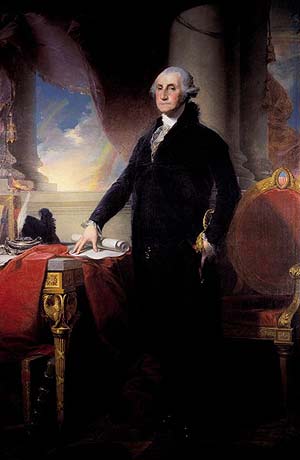February 27, 2007
Gratuitous Artistic Criticism Criticism

The Royal Gallery's exhibition Citizens and Kings: Portraits in the Age of Revolution, 1760-1830, looks quite interesting. However, I was bugged a bit by something Richard Dorment says in an otherwise informative critique of Gibert Stuart's portrait of George Washington above. Dorment nicely contrasts this portrait with Sir Joshua Reynolds' portrait of King George III to demonstrate the gradual shift from the concept of Divine Rule to that of Rule of Law. However, he then says:
Stuart's iconic portrait looks forward to Jacques Louis David's famous 1812 image of another commoner-turned-ruler, Napoleon.
This statement bugs me because say what you like about Old George, he was no commoner and he would have been mortified to be taken as one. Washington considered himself a Virginia Gentleman, thank you very much, complete with large estate and bona fide coat of arms (on which the design of the Dee Cee flag is based, in case you didn't know).
The American Revolution had little or nothing to do with the kind of social upheaval that eventually produced the likes of Napoleon in France. (Interestingly, the split between Loyalist and Rebel sympathies cut right down the middle of the social pyramid.) Instead, it had everything to do with Northern entrepreneurs and Southern landed gentry banning together to throw off the Imperial yoke so that they could go about their business profitably.
The injection of populist commentary like Dorment's, however much just in passing, clouds that distinction. However, it's a distinction that needs to be preserved, as I feel it to be critical to understanding why the American Revolution ended with the birth of a new, vibrant nation while the French Revolution passed through a hidious period of carnage and bloodshed, leading on to tyranny.
There is also the personality difference. George did not aspire to kingship, Napoleon did. America could have turned out much differently with a different first Commander-in-Chief. By lumping the two together, the comment also misses that little nuance.
Posted by: John at February 27, 2007 12:10 PMDoesn't commoner just mean someone who is neither the king nor a member of the titled aristocracy? Washington was more a member of the gentry than he was a member of the aristocracy, wasn't he? In any case, I don't like lumping the two of them together because, as John points out, Washington didn't want to be king, while Napoleon wanted that and a whole lot more.
Posted by: Rachel at February 27, 2007 12:49 PMYeah, perhaps I am over-reacting just a bit. But a comparison of Washington and Napoleon sets my teeth on edge.
Posted by: Robbo the LB at February 27, 2007 01:07 PMAh. Well in a world where Bush equals Hitler and a bunch of moonbats wish the VP had been killed by terrorists, it's not surprising that one should quail at such a comparison. Distinctions do matter.
Posted by: Rachel at February 27, 2007 01:27 PMMost important distinction, Washington refused the crown, Napoleon seized it to crown himself. USA, still on the first Republic. France on number five. The only advantage Napoleon has is having very nice brandy named after him.
Posted by: rbj at February 27, 2007 02:46 PMI see the nuance that Napoleon (and France) are successors, hence a refinement. Perhaps he wants to say France is superior. Perhaps, also, I'm getting too sensitive because of overexposure to all the moonbat screeching.
The line irks me too. Comparing Washington to that little runt...grrrr.
Posted by: ahriman at February 27, 2007 03:07 PMIs that a blackberry on the table next to the red scarf? Oh no, that's Jeb's portrait, not George's.
Posted by: Babs at March 1, 2007 01:39 PM

 Image courtesy of the lovely and talented
Image courtesy of the lovely and talented 